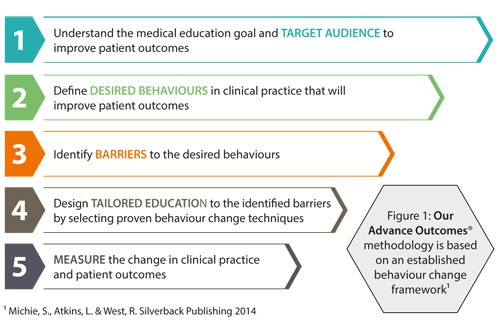 Lucid is an award-winning agency, creating medical education designed to change healthcare professional (HCP) behaviour and in turn, changing patients’ lives. Their unique approach, known as ‘Advanced Outcomes’, focuses on producing measurable behaviour change in HCPs performance. To ensure this approach encompasses the latest academic thinking in behaviour change, Lucid employs and works closely with health psychology specialists such as Ella Nuttall. We asked Ella to explain why she thinks health psychologists have an important role to play in the pharmaceutical industry.
Lucid is an award-winning agency, creating medical education designed to change healthcare professional (HCP) behaviour and in turn, changing patients’ lives. Their unique approach, known as ‘Advanced Outcomes’, focuses on producing measurable behaviour change in HCPs performance. To ensure this approach encompasses the latest academic thinking in behaviour change, Lucid employs and works closely with health psychology specialists such as Ella Nuttall. We asked Ella to explain why she thinks health psychologists have an important role to play in the pharmaceutical industry.
Why is behaviour change so important in medical education?
“Often, medical education programmes are not specific enough about what they are trying to achieve within clinical practice. They create awareness, and provide a forum to deliver messages, but often without providing a mechanism for bringing about sustainable change in behaviour. Anyone can get education from a text book or the latest publication, but that won’t change behaviour in the long term. The aim of medical education should be to support physicians in changing their clinical practice; to provide the knowledge, skills and tools they need in order to create continued improvement in patient outcomes. It’s not a static process but one that is continually evolving as more evidence and treatments become available.”
Why should pharma look to health psychology?
“It is becoming increasingly important for the pharmaceutical industry to demonstrate the tangible outcomes and metrics of how they are contributing to patients’ lives through medical education. Health psychology looks to a deeper understanding of what people want or need, why they behave in certain ways, and their barriers to change. Within the medical education setting, we can apply validated techniques founded in the health-psychology, behaviour-change evidence base, to develop specific, tailored interventions that overcome barriers to changes in clinical practice. Health psychologists offer input and advice on programme development; providing in-depth, structured thinking about the medical education goal, the clinical practice behaviours required to address that goal, suitable tailored interventions and the metrics needed to measure the desired change.”
Why is behaviour change receiving so much attention?
“Other industries, for example the sustainability industry, have been using behaviour change techniques for many years. They understand that it is the best way to achieve a long-term change in people’s behaviour. Within the last 10 years there has been much more research in health psychology; the evidence base has increased, and, as such, interest is growing in behaviour change techniques. The health industry is starting to catch up.”
How do you incorporate your expertise into the programmes Lucid develops?
“At Lucid we have created ‘Advanced Outcomes’; a five-step framework for achieving specific, measurable changes in behaviour (Figure 1), which we apply to our medical education programmes in order to advance clinical practice and improve patient outcomes. As part of my role as a health psychology specialist at Lucid Group, I review the latest literature and evolve our processes and frameworks to stay up to date with the latest evidence base. This is part of what keeps Lucid innovative and unique, ensuring we are always ahead of the game. I am also responsible for training our internal team on our behaviour change process and implementation tools.

Figure 1. Lucid’s five-step model for behaviour change; Advanced Outcomes
“The remaining part of my time is spent implementing Advanced Outcomes into the medical education programmes we are developing. This is one of the most rewarding and interesting aspects of my work. The more programmes we do, the more ambitious and creative we become, and the more specific we are about the behaviours we want to change. A recent highlight for me was when we rolled-out an Advanced Outcomes programme with experts from Mount Sinai Hospital in New York who praised our praised our incredibly revolutionary approach.”
What sets Lucid apart in the industry?
“Advanced Outcomes and behaviour change is embedded within the company culture at Lucid. Every new starter has a specific induction session and every business unit is supported by a member of the Advanced Outcomes expert group, who have received in-depth training. No one thinks as deeply as we do – we constantly question and challenge ourselves to ensure we are developing high-impact, industry-leading programmes.”
The rationale for employing an expert health psychologist is clear, if you want to make a difference with medical education you have to move beyond message delivery to drive a change in HCP behaviour. With this in mind Lucid Group will continue to embrace the latest academic thinking and employ the expertise of health psychology specialists like Ella to ensure they develop medical education programmes that improve patient outcomes. In this way, it will continue to change patients’ lives.
Qualifications: BSc Psychology University of Sussex, 1st class honours; MSc Health Psychology University College London, Distinction
Current role: Health Psychology Specialist for Lucid Group





